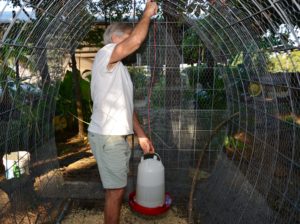Backyard poultry producers should be wary of high temperatures
- Writer: Adam Russell, 903-834-6191, [email protected]
- Contact: Dr. Craig Coufal, 979-845-4319, [email protected]
COLLEGE STATION – As temperatures rise, backyard poultry producers should be mindful of summer conditions that could stunt production or kill birds, said a Texas A&M AgriLife Extension Service expert.

Dr. Craig Coufal, AgriLife Extension poultry specialist, College Station, said backyard egg and poultry producers should be cautious about rising summer temperatures and take steps to prevent declines in production or increased bird deaths.
“We’re starting to see some high temperatures and it’s always a good idea to remind people that they need to take preemptive measures to protect their birds from the heat,” he said.
Chickens are like dogs in that they don’t sweat and must pant to regulate their body temperatures, Coufal said.
The first sign of heat stress is panting, or rapid breathing with the mouth open, Coufal said. Second, the birds will stand with their wings outstretched from their body, trying to get air movement across the torso to lose heat.
Coufal said producers should consider three things that can help chickens keep cool – shade from direct sun, access to cool water and plenty of air movement by natural breeze or mechanical ventilation.
Birds should have access to shade at all times, Coufal said.
“The sun can be deadly for birds if they don’t have shade available throughout the day as the sun moves across the sky,” he said. “A chicken coop can turn into a furnace if it’s in continuous afternoon sun.”
Protecting water sources from direct sun to provide birds access to cool water is also a major component of helping them regulate their body temperatures, Coufal said.
“Producers should be mindful of drinkers, water lines and garden hoses that are exposed to direct sunlight. If the drinkers or water lines are in the sun with little fresh water flow, the water in them can reach very high temperatures in a short time,” he said. “It’s not just access to water that’s important, it’s access to cool water — and plenty of it.”
On extreme days when temperatures climb into the triple digits, Coufal said putting ice in the birds’ drinking water to lower the temperature can encourage water consumption and help them deal with heat stress.
Good ventilation and air flow is also a crucial component to keeping birds cool, Coufal said.
“That can be an open area that maintains a natural breeze or mechanical ventilation with a fan or anything that will move or cool the air,” he said.
Coufal said aside from killing birds, heat stress can reduce the quantity and quality of eggs and disrupt weight gains in broilers. Heat-stressed birds will consume less feed to reduce their digestive heat output. There may also be less quality forage available during the summer heat if chickens are free-ranging birds.
One common result of heat stress among laying hens is thin eggshells, Coufal said.
“To maintain good, quality egg production, producers should supplement the birds’ diet with a high-quality complete ration, such as a pelleted feed with high nutrient and energy content,” he said. “If they start seeing thin eggshells, the birds can also be supplemented with extra calcium such as ground limestone or oyster shells.”


